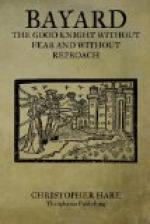At this every one smiled, for Bayard always had such a bright and pleasant way of putting things that men loved to hear him. His advice was followed and all was made ready for a determined assault on the city next day, which was Good Friday. The captains and their men set forth in gallant mood, as though they went to a wedding, and so fierce was the attack of the artillery that before long a small breach was made in the fortification, but the defenders fought so well that it was not possible to break through and at length the retreat was sounded. This was really a fortunate thing, as if the soldiery had begun pillaging the place the coming battle would certainly have been lost, and the relieving army was now within two miles of Ravenna.
It would be too long to follow the whole story of that fierce and desperate conflict, where both sides fought with the utmost skill and valour. The Spaniards certainly carried out their usual tactics of constantly taking aim at the horses of the French riders, for they have a proverb which says: “When the horse is dead the man-at-arms is lost.” Their war-cry was: “Spain! Spain! St. Iago!” to which the other side replied by another furious onslaught to the shouts of “France! France!” And wherever the Good Knight passed, “Bayard! Bayard!” was the clarion note which cheered on his company, ever in the forefront of battle. The French artillery was used with great success, and as for the young general, Gaston de Foix, he led forward his men again and again with splendid success. It was late in the day and already the tide of victory was on the side of the French, when the Good Knight, who was riding in pursuit of the flying enemy, said to the Duke: “Praise be to God, you have won the battle, my lord, and the world will ring with your fame. I pray you to remain here by the bridge and rally your men-at-arms to keep them from pillaging the camp. But do not leave, I entreat, till we return.” It would have been well, indeed, if he had remembered this, but some time later, in the tumult and confusion, he saw some Gascons being driven across the canal by a few Spanish fugitives, and with his usual impetuous chivalry, Gaston threw himself to their rescue, without waiting to see who followed him.




